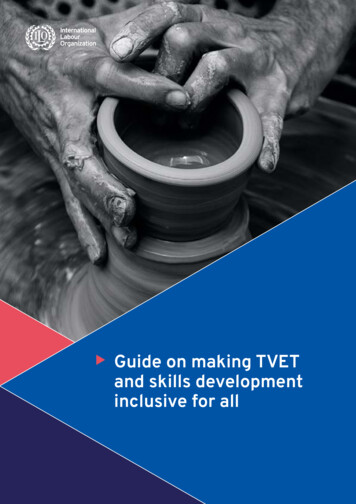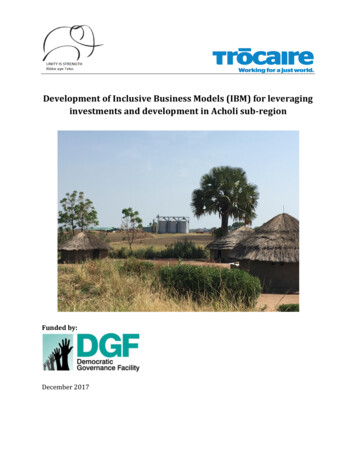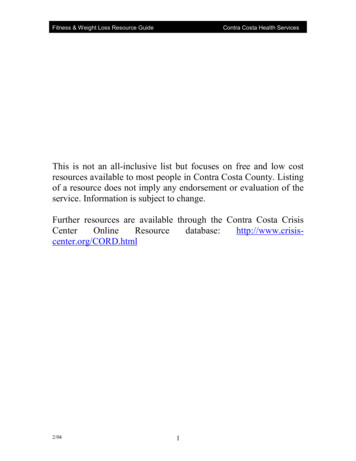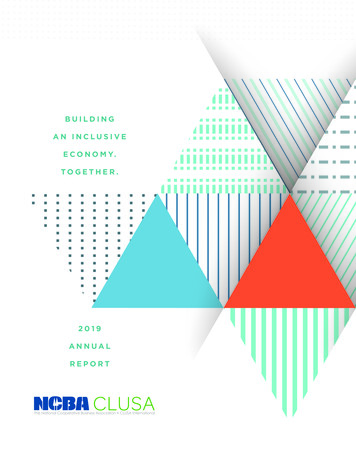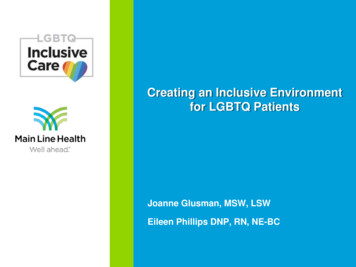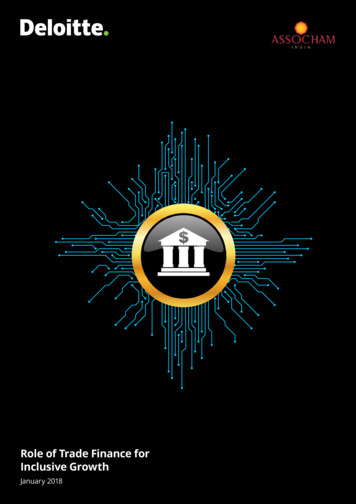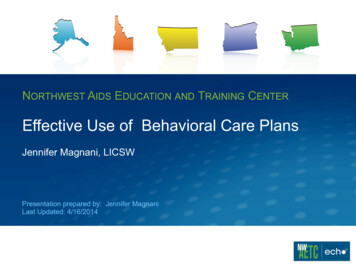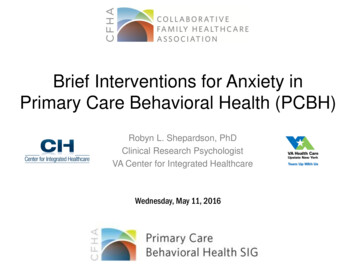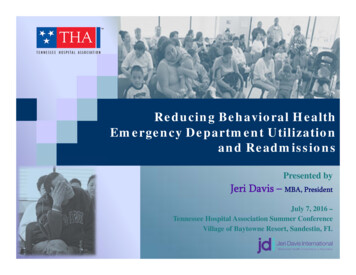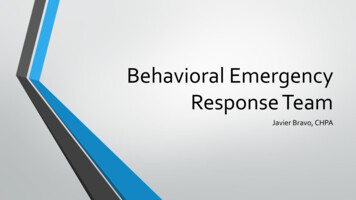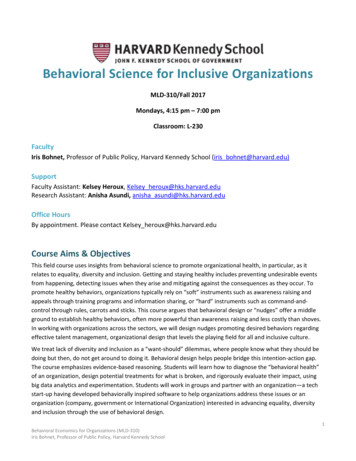
Transcription
Behavioral Science for Inclusive OrganizationsMLD-310/Fall 2017Mondays, 4:15 pm – 7:00 pmClassroom: L-230FacultyIris Bohnet, Professor of Public Policy, Harvard Kennedy School (iris bohnet@harvard.edu)SupportFaculty Assistant: Kelsey Heroux, Kelsey heroux@hks.harvard.eduResearch Assistant: Anisha Asundi, anisha asundi@hks.harvard.eduOffice HoursBy appointment. Please contact Kelsey heroux@hks.harvard.eduCourse Aims & ObjectivesThis field course uses insights from behavioral science to promote organizational health, in particular, as itrelates to equality, diversity and inclusion. Getting and staying healthy includes preventing undesirable eventsfrom happening, detecting issues when they arise and mitigating against the consequences as they occur. Topromote healthy behaviors, organizations typically rely on “soft” instruments such as awareness raising andappeals through training programs and information sharing, or “hard” instruments such as command-andcontrol through rules, carrots and sticks. This course argues that behavioral design or “nudges” offer a middleground to establish healthy behaviors, often more powerful than awareness raising and less costly than shoves.In working with organizations across the sectors, we will design nudges promoting desired behaviors regardingeffective talent management, organizational design that levels the playing field for all and inclusive culture.We treat lack of diversity and inclusion as a “want-should” dilemmas, where people know what they should bedoing but then, do not get around to doing it. Behavioral design helps people bridge this intention-action gap.The course emphasizes evidence-based reasoning. Students will learn how to diagnose the “behavioral health”of an organization, design potential treatments for what is broken, and rigorously evaluate their impact, usingbig data analytics and experimentation. Students will work in groups and partner with an organization—a techstart-up having developed behaviorally inspired software to help organizations address these issues or anorganization (company, government or International Organization) interested in advancing equality, diversityand inclusion through the use of behavioral design.1Behavioral Economics for Organizations (MLD-310)Iris Bohnet, Professor of Public Policy, Harvard Kennedy School
Course Format, Procedures and PoliciesThe course consists of three modules:1. Introduction to Behavioral Design and Bias in Organizations2. De-biasing Talent Management3. Designing InclusionThis is a field course. Field Courses are customized according to individual faculty research and aredesigned to enable students to take an active role in the construction of their learning. In manyinstances, these courses are built with a specific focus in mind and teams of students are called uponto collaborate directly with local partners to scope projects, collect data and organize work plansduring the course. Field courses tailor learning via classroom experiences, and work in teams togetherwith the instructor and/or the partner organization.The course will meet in 9 double-sessions in class and 5 scheduled group sessions (2 with theinstructor, 2 with the partner organization and 1 with both). During class, in addition to discussresearch and engage in case analyses and simulations, we will meet with representatives from theprivate and the public sector who either have developed or are using behavioral tools to de-bias talentmanagement and/or create inclusive work environments. The core of the class will be student projectswhere groups of 5-7 students will address a design problem posed by one of the organizations.Examples of participating organizations include Accenture (TBC), Applied, the City of Boston (TBC), theCity of Cambridge (TBC), Jaba Talks, L’Oréal, Parexel, pymetrics, UNDP (TBC) and UNICEF.There are no prerequisites for taking this class.GradingFinal grades will be determined based on performance in the following(1) Group project(2) Class conduct(60%)(40%)Note: Students will be evaluated by the instructor as well as by their peers.Group ProjectStudents are expected to fully participate in the work of their group, including attending all groupmeetings, whether with the group alone, with the instructor or the partner organization, and assumeresponsibility for discrete parts of the group project. To maximize team performance and benefit fromall individual contributions, team members will evaluate each other at the end of the project, in termsof the quality and the quantity of their individual contributions, their (emotional, social and technical)2Behavioral Economics for Organizations (MLD-310)Iris Bohnet, Professor of Public Policy, Harvard Kennedy School
ability to advance the work of the team as a whole and their behavior and conduct. Students areexpected to treat each other with respect, making the collaboration an inclusive experience for all.Class ConductStudents are expected to come to class prepared to discuss the readings/cases, participate insimulations and have an informed exchange with our guests. The goal is to make comments thatsignificantly advance the class discussion, so quality is more important than quantity (but somequantity is necessary for quality to be judged). Students are expected to treat each other with respect,making the class a safe space for all to flourish. The class will be run based on the following norms:punctuality, no technology in class, attendance and presence during entire class, no unnecessaryexternalities (e.g., extensive meals), cold calling. To maximize class effectiveness, students will beasked to nominate three people who most advanced the learnings in class at the end of the course.IntegrityAll course activities, including class meetings and the group project are subject to HKS academic codesand codes of conduct. If you need to miss class, please let me know as early as possible and, unless thisis an emergency, plan ahead to make sure you stay in the loop. Unexcused absences will affect theclass participation grade.Course Materials and AccessRequired ReadingsStudents should read two books and carefully study the readings in preparation for class:Iris Bohnet, What Works: Gender Equality by Design (Cambridge, MA: Belknap/Harvard UniversityPress, 2016).Richard H. Thaler and Cass R. Sunstein, Nudge: Improving Decisions About Health, Wealth, andHappiness, Revised & Expanded edition (New York: Penguin Books, 2009).Course WebsiteAll enrolled students have access to the course website at canvas.harvard.edu. The course calendarand links to the required readings can be found there.3Behavioral Economics for Organizations (MLD-310)Iris Bohnet, Professor of Public Policy, Harvard Kennedy School
Course ScheduleNote: Class sessions marked in blue. Deadlines marked in red. Group meetings marked in green.September 11, 2017Class 1: IntroductionPreparation:1. What Works: Introduction, Chapters 1 and 2September 18, 2017Deadline: Sign up for group projectClass 2: Diagnosis and Treatment (1): Data and Behavioral DesignPreparation:1. What Works: Chapters 6 and 72. “Hiring Tool Uses Behavioural Science to Stop Recruitment Bias,” New Scientist, accessedJuly 19, 2017, -bias/3. Kate Glazebrook, “Hiring, Honeybees and Human Decision-Making,” Finding Needles inHaystacks, June 29, 2017, 63Guest: Kate Glazebrook, CEO and Co-founder, AppliedSeptember 19, 2017, 5pmDeadline: Sign up for a 45 min. group meeting with Professor Bohnet on Sept. 20, 21 or 22.September 20-22, 2017Group Meeting 1Meet with Professor Bohnet in the Women and Public Policy Program suite on the ground floor of Taubmanbuilding at HKS.4Behavioral Economics for Organizations (MLD-310)Iris Bohnet, Professor of Public Policy, Harvard Kennedy School
September 25, 2017:Class 3: Diagnosis and Treatment (2): De-biasing Practices and ProceduresPreparation:1. What Works: Chapters 8 and 92. Dan Kopf, “More Economists Should Use Machine Learning to Do Their Jobs Better,” Quartz,accessed July 19, 2017, singmachine-learning-to-do-their-jobs-better/3. Richard Feloni, “Consumer-Goods Giant Unilever Has Been Hiring Employees Using BrainGames and Artificial Intelligence — and It’s a Huge Success,” Business Insider, accessed July19, 2017, -intelligence-hiring-process2017-6.Guest: Frida Polli, CEO and Co-founder, pymetricsOctober 2Class 4: EvaluationPreparation:1. Nava Ashraf et al., Evaluating Microsavings Programs: Green Bank of the Philippines (A, Band C).2. Prime Minister and Cabinet, “Behavioural Economics,” (April 22, ioural-economicsGuest: Michael Hiscox, Founding Director of the Behavioral Economics Team (BETA), Department ofthe Prime Minister and Cabinet, Australian GovernmentOctober 9No classDeadline: Finish reading Richard H. Thaler and Cass R. Sunstein, Nudge: Improving Decisions AboutHealth, Wealth, and Happiness.October 16Group meeting 25Behavioral Economics for Organizations (MLD-310)Iris Bohnet, Professor of Public Policy, Harvard Kennedy School
Meet for approx. 2-3 hours, ideally during class time, with your partner organization (in-person or viaSkype, self-organized but let Kelsey know via email when and where the meeting will take place, incl. ifyou meet on a different day/time)October 23Class 5: UptakePreparation:1. What Works, Chapters 3, 4 and 52. Nava Ashraf, Natalie Kindred, and Richard Sedlmayr, Uptake of Malaria Rapid Diagnostic Tests,911007-PDF-ENG (2011). agnostictests/911007-PDF-ENG3. Eli Wald, Biglaw Identity Capital: Pink and Blue, Black and White, 83 Fordham L. Rev. 2509(2015). Available at: t: Laura Acosta, GoodwinOctober 30, 2017Class 6: Diversity in TeamsPreparation:1. What Works: Chapters 10 and 112. (Re)Building a Global Team: Tariq Khan at Tek, Harvard Business School Case px?num 460023. Fernandes, Catarina, and Jeff Polzer. "Diversity in Groups." In Emerging Trends in the Social andBehavioral Sciences: An Interdisciplinary, Searchable, and Linkable Resource, R. A. Scott and S.M. Kosslyn (eds.). Hoboken, NJ: John Wiley & Sons, 2015. Electronic.Guest: Michelle Gadsden-Williams, Accenture6Behavioral Economics for Organizations (MLD-310)Iris Bohnet, Professor of Public Policy, Harvard Kennedy School
November 3, 2017, 5pmDeadline: Sign up for a 45 min. group meeting with Professor Bohnet, November 7-16.November 6, 2017Class 7: Designing DiversityPreparation:1. What Works, Chapters 12 and 132. John Beshears, Iris Bohnet and Jenny Sanford, Increasing Gender Diversity in the Boardroom:The United Kingdom in 2011 (A), Harvard Business School Case (draft)Guest: Aida Sabo, ParexelNovember 7-16Group Meeting 3Meet with Professor Bohnet in the Women and Public Policy Program suite on the ground floor of Taubmanbuilding at HKS.Group Meeting 4Meet with your group during class time (Nov. 13) and check-in with your partner organization (viaemail or Skype, self-organized)November 20Class 8: Designing InclusionPreparation:1. Google Project Oxygen: Do Managers Matter, Harvard Business School Case -oxygen-do-managers-matter/313110-PDF-ENG2. Laura Sherbin and Ripa Rashid, “Diversity Doesn’t Stick Without Inclusion,” Harvard BusinessReview, February 1, 2017, hout-inclusionNovember 27Class 9: Discussion of Group Projects7Behavioral Economics for Organizations (MLD-310)Iris Bohnet, Professor of Public Policy, Harvard Kennedy School
December 8, 2017Deadline: Group project dueDecember 11- 20, 2017Group Meeting 5Present your final project to your partner organization and Professor Bohnet (scheduled by Kelsey)8Behavioral Economics for Organizations (MLD-310)Iris Bohnet, Professor of Public Policy, Harvard Kennedy School
ss 1: Introductionto Behavioral Design18Class 2: Diagnosis &Treatment (1): Dataand BehavioralDesignDeadline: Sign up forgroup project25Deadline: Sign upfor a 45 min. groupmeeting withProfessor Bohnet onSept. 20, 21 or 2226Group Meeting 1: Meet with Professor.Bohnet in the Women and Public PolicyProgram suite on the ground floor ofTaubman building at HKS.27282930Class 3: Diagnosis &Treatment (2): DeBiasing Practices &Procedures9Behavioral Economics for Organizations (MLD-310)Iris Bohnet, Professor of Public Policy, Harvard Kennedy School
29Class 4: Evaluation9No classDeadline: Finishreading Nudge byThaler and Sunstein16Group meeting 2Meet for approx. 2-3hours, ideally duringclass time, with yourpartner organization23Class 5: Developmentand Promotion3031Class 6: Diversity inTeams10Behavioral Economics for Organizations (MLD-310)Iris Bohnet, Professor of Public Policy, Harvard Kennedy School
SAT/SUN1234/5891011/12Class 7: DesigningDiversity & Inclusion(1)-- Group Meeting 3: Meet with Professor Bohnet in the Women andPublic131415161718/192425/26Policy Program suite on the ground floor of Taubman building at HKS-Group Meeting 4Meet with your groupduring class time andcheck-in with yourpartner organization20212223282930Class 8: DesigningDiversity & Inclusion(2)27Class 9: Discussion ofGroup Projects11Behavioral Economics for Organizations (MLD-310)Iris Bohnet, Professor of Public Policy, Harvard Kennedy School
AYSAT/SUN12/389/10Deadl
1. Google Project Oxygen: Do Managers Matter, Harvard Business School Case 9-313 110. -managers-matter/313110-PDF-ENG 2. Laura Sherbin and Ripa Rashid, “Diversity Doesn’t Stick Without Inclusion,” Harvard Business

